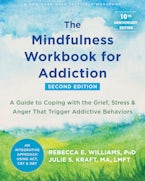By Rebecca E. Williams, PhD, coauthor of The Mindfulness Workbook for Addiction, 2nd Edition
Many people in recovery are also worried about their mental health. Neglecting your mental health has a sneaky way of triggering addictive behavior. According to the National Survey of Drug Use and Health (2019), over nine million people in the US struggle with both mental health concerns (like anxiety and depression) and addiction. Here are some simple tips you can use to respect and take care of your mental health as you strengthen your recovery from addictive behaviors. These tips are easy to remember because they spell LINK.
Listen to your inner best friend.
When you fall into a spiral of negative thoughts, wouldn’t you want to know what your best friend would say to you? Well, you can tune into that sage advice. The advice might sound something like this: choose thoughts that are helpful for your recovery and lean into what will help you feel better. The best way to listen is to find a quiet space, turn off your cell phone, or step away from your computer for five minutes. Ask yourself this question: “What do I need right now to feel better?” This is the beginning of tapping into your self-compassion. And believe me, self-compassion is perhaps the most important part of your recovery from addiction and mental distress.
Involve your body.
If you have been sitting for long periods of time without a break, that can have a negative impact on your mental health. Whether it’s being at your computer for hours on end, binge-watching TV, or just being a couch potato, now is the time to move. You don’t have to gear up to run a marathon; keep it small and simple. Your body and mind will thank you when you take yourself for a walk around the neighborhood, breathe in the fresh air, and notice the trees and plants as you stroll. Even a few small, ten-minute stretch breaks throughout the day will have a big impact. Ask yourself this question: “Where would I like to take myself now for a healthy break?” Remember that the brain can only focus for a maximum of ninety minutes before you start to lose interest.
Notice any cravings.
When you start to feel stressed, overwhelmed, disappointed, or angry, you might begin to crave alcohol or drugs to numb out. This was your old way of coping with a tidal wave of feelings. Bravo for noticing the craving before you reach for the drug or alcohol. Instead of using your old coping mechanisms, now you have an opportunity to pivot to a new, healthier coping strategy. Cravings are a way of letting you know that there is something causing you to feel out of balance. Ask yourself this question: “What would help me feel centered and calm right now?” Your answer here will set you on your way to breaking old patterns and realigning with your goal of daily healing.
Know your limits.
If, in the past, you said yes to everything and everyone, there is a good chance that you got exhausted and even frustrated. Being exhausted was a surefire way to reach for alcohol or drugs in an effort to feel better or to tune others out. This certainly doesn’t help your mental health. There is a way to set limits on how much you can do for others in a caring way that respects your healthy boundaries. The next time someone asks you to do something that you don’t want to do (or don’t have time to do), here are a few ways to respond with kindness. Politely say, “Thank you for reaching out to me. Unfortunately, I will not be able to do that. Right now, I am focusing on my health. Please keep me in mind in the future.” This takes some practice. Once you master this way of responding to those requests you do not want to do, it will get easier. Ask yourself this question: “Is there something I need to say ‘no’ to today?” Knowing and respecting your limits frees you up to take care of your mental health and keeps you firmly grounded in your recovery.
Choose one or two of these LINK tips to try when you are feeling stressed or overwhelmed. Give yourself a few minutes to answer the questions you find in each of the tips. Your answers will give you a much-needed reset so you can stay on your recovery path and take care of your mental well-being.
Rebecca E. Williams, PhD, is an award-winning author, psychologist, and wellness expert specializing in healthy recovery from mental illness, addiction, and life challenges. Her work focuses on building resilience and promoting well-being. Rebecca is coauthor of The Gift of Recovery and The Mindfulness Workbook for Addiction. After more than twenty years as a clinic director at the VA San Diego Healthcare System and associate clinical professor at the University of California, San Diego School of Medicine; she has turned her focus to healing and empowering health care professionals through her books, podcasts, and webinars.



 Part 2: What to Do When a Client Is Participating in Self-Judgment?
Part 2: What to Do When a Client Is Participating in Self-Judgment?